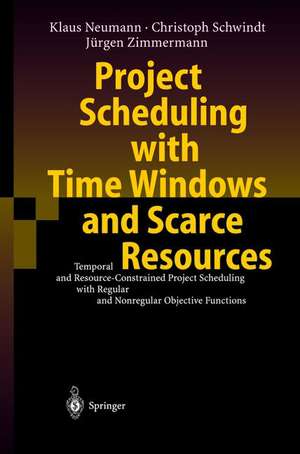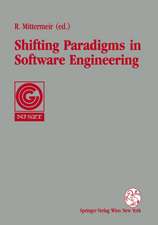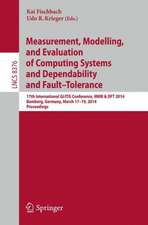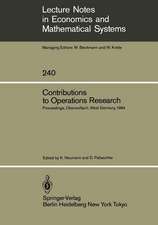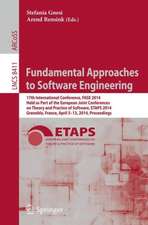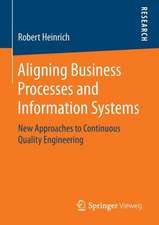Project Scheduling with Time Windows and Scarce Resources: Temporal and Resource-Constrained Project Scheduling with Regular and Nonregular Objective Functions
Autor Klaus Neumann, Christoph Schwindt, Jürgen Zimmermannen Limba Engleză Hardback – 18 iun 2003
| Toate formatele și edițiile | Preț | Express |
|---|---|---|
| Paperback (1) | 992.11 lei 6-8 săpt. | |
| Springer Berlin, Heidelberg – 18 iul 2012 | 992.11 lei 6-8 săpt. | |
| Hardback (1) | 998.87 lei 6-8 săpt. | |
| Springer Berlin, Heidelberg – 18 iun 2003 | 998.87 lei 6-8 săpt. |
Preț: 998.87 lei
Preț vechi: 1248.59 lei
-20% Nou
Puncte Express: 1498
Preț estimativ în valută:
191.17€ • 199.05$ • 161.56£
191.17€ • 199.05$ • 161.56£
Carte tipărită la comandă
Livrare economică 07-21 martie
Preluare comenzi: 021 569.72.76
Specificații
ISBN-13: 9783540401254
ISBN-10: 3540401253
Pagini: 404
Ilustrații: XIII, 385 p. 149 illus.
Dimensiuni: 155 x 235 x 27 mm
Greutate: 0.74 kg
Ediția:2nd ed. 2003
Editura: Springer Berlin, Heidelberg
Colecția Springer
Locul publicării:Berlin, Heidelberg, Germany
ISBN-10: 3540401253
Pagini: 404
Ilustrații: XIII, 385 p. 149 illus.
Dimensiuni: 155 x 235 x 27 mm
Greutate: 0.74 kg
Ediția:2nd ed. 2003
Editura: Springer Berlin, Heidelberg
Colecția Springer
Locul publicării:Berlin, Heidelberg, Germany
Public țintă
ResearchCuprins
1 Temporal Project Scheduling.- 1.1 Minimum and maximum time lags.- 1.2 Activity-on-node project networks.- 1.3 Temporal project scheduling computations.- 1.4 Orders in the set of activities.- 2 Resource-Constrained Project Scheduling — Minimization of Project Duration.- 2.1 Formulation of the problem.- 2.2 Cycle structures in activity-on-node project networks.- 2.3 Properties of the feasible region.- 2.4 Different types of shifts and sets of schedules.- 2.5 Branch-and-bound and truncated branch-and-bound methods.- 2.6 Priority-rule methods.- 2.7 Schedule-improvement procedures.- 2.8 Experimental performance analysis.- 2.9 Application to make-to-order production in manufacturing industry.- 2.10 Regular objective functions different from project duration.- 2.11 Calendarization.- 2.12 Project scheduling with cumulative resources.- 2.13 Project scheduling with synchronizing resources.- 2.14 Project scheduling with sequence-dependent changeover times.- 2.15 Multi-mode project scheduling problems.- 2.16 Application to batch production in process industries.- 3 Resource-Constrained Project Scheduling — Minimization of General Objective Functions.- 3.1 Different objective functions.- 3.2 Additional types of shifts and sets of schedules.- 3.3 Classification of objective functions.- 3.4 Time complexity of time-constrained project scheduling.- 3.5 Relaxation-based approach for function classes 1 to 5.- 3.6 Tree-based approach for function classes 6 and 7.- 3.7 Priority-rule methods.- 3.8 Schedule-improvement procedures.- 3.9 Application to investment projects.- 3.10 Hierarchical project planning.- References.- List of Symbols.- Three-Field Classification for Resource-Constrained Project Scheduling.
Recenzii
From the reviews of the second edition:
"The book deals with so-called temporal project scheduling with schedule-dependent time windows. … Overall, the book has produced a fairly comprehensive and well-organized treatment of these topics. … the authors have done a terrific job of binding them–including many of their own contributions–together in a coherent way. … Their well- grounded choices make the technical details easier to follow. … As such, the book represents a noteworthy addition to project-scheduling reference list for both academicians and practitioners alike." (J Xue, Journal of the Operational Research Society, Vol. 56, 2005)
"The book presents a state of the art in the sub-field of scheduling theory, i.e. the project scheduling under scarce resources written by well known experts in the field. Although several books have been recently published in that area, one can observe a number of features which distinguish this book from the others. … The book is thoroughly written and the mathematics used is adequate to the needs. It contains also many algorithms described in pseudo-code. Several examples complement nicely their presentation." (Jacek Blazewicz, Zentralblatt MATH, Vol. 1059 (10), 2005)
"The book presents the state of the art of deterministic resource-constrained project scheduling with time windows. … A thorough structural analysis of the feasible region of project scheduling problems and a classification and detailed investigation of objective functions are performed, which can be exploited for developing efficient exact and heuristic solution methods. New interesting applications of project scheduling to production and operations management as well as investment projects are discussed." (GfPMagazin – online, April, 2005)
"At last a professional book dealing with the exact formulation of project scheduling. When I obtained it I first couldn’t believe that there is really a book withdefinitions, propositions, proofs, lemmas and theorems about how to schedule activities with the metra potential method. Fortunately, there are also a lot of examples and concrete algorithms that describe simple scheduling tasks as well as schedule-improvement procedures. … The book is truly scientific, you find e.g. a comprehensive list of references of more than 200 scientific publications." (Dr. Georg Angermeier, www.projektmagazin.de, August, 2004)
"The book deals with so-called temporal project scheduling with schedule-dependent time windows. … Overall, the book has produced a fairly comprehensive and well-organized treatment of these topics. … the authors have done a terrific job of binding them–including many of their own contributions–together in a coherent way. … Their well- grounded choices make the technical details easier to follow. … As such, the book represents a noteworthy addition to project-scheduling reference list for both academicians and practitioners alike." (J Xue, Journal of the Operational Research Society, Vol. 56, 2005)
"The book presents a state of the art in the sub-field of scheduling theory, i.e. the project scheduling under scarce resources written by well known experts in the field. Although several books have been recently published in that area, one can observe a number of features which distinguish this book from the others. … The book is thoroughly written and the mathematics used is adequate to the needs. It contains also many algorithms described in pseudo-code. Several examples complement nicely their presentation." (Jacek Blazewicz, Zentralblatt MATH, Vol. 1059 (10), 2005)
"The book presents the state of the art of deterministic resource-constrained project scheduling with time windows. … A thorough structural analysis of the feasible region of project scheduling problems and a classification and detailed investigation of objective functions are performed, which can be exploited for developing efficient exact and heuristic solution methods. New interesting applications of project scheduling to production and operations management as well as investment projects are discussed." (GfPMagazin – online, April, 2005)
"At last a professional book dealing with the exact formulation of project scheduling. When I obtained it I first couldn’t believe that there is really a book withdefinitions, propositions, proofs, lemmas and theorems about how to schedule activities with the metra potential method. Fortunately, there are also a lot of examples and concrete algorithms that describe simple scheduling tasks as well as schedule-improvement procedures. … The book is truly scientific, you find e.g. a comprehensive list of references of more than 200 scientific publications." (Dr. Georg Angermeier, www.projektmagazin.de, August, 2004)
Caracteristici
Presents a survey of present state of resource-constrained project scheduling including models, solution methods, and applications Includes supplementary material: sn.pub/extras
